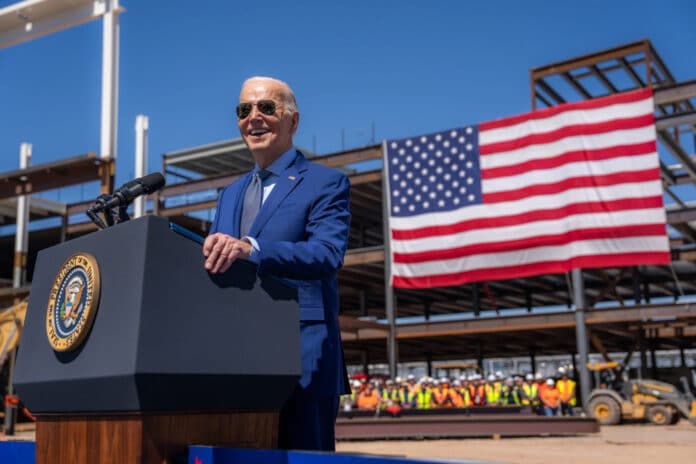
(Daily Caller News Foundation) — A net total of 0 manufacturing jobs were created in the month of March despite the Biden administration’s many programs and public spending to boost hiring in the sector.
![]()
The number of manufacturing jobs in the United States remained at 12,956,000, the same figure as February, following a decline of 10,000 jobs from January, according to the Bureau of Labor Statistics (BLS) Employment Situation Summary released on Friday. The figure comes despite the Biden administration launching an aggressive campaign to increase manufacturing employment through public subsidies enacted under the Infrastructure Investment and Jobs Act (IIJA) of 2021 and the Inflation Reduction Act (IRA) of 2022.
“[T]he Inflation Reduction Act’s climate and clean energy tax incentives have the potential to drive investment that will support more than 1 million jobs in energy and related manufacturing sectors over the coming decade,” wrote the Department of the Treasury in a press release about the IRA’s potential. “By creating incentives for paying prevailing wages and utilizing qualified apprentices from registered apprenticeship programs in clean energy projects, the Inflation Reduction Act is helping expand well-paying union jobs and support proven pathways into the industry.”
The Inflation Reduction Act incentivizes the domestic production of solar panels and wind turbines, boosting American manufacturing and creating good-paying American jobs.
We’re building a clean energy economy. pic.twitter.com/V6EvfCPQfj
— President Biden (@POTUS) August 3, 2023
Between 2022 and 2032, the IRA will cost U.S. taxpayers $1.2 trillion in subsidies and incentives, according to analysis by Goldman Sachs.
Within the manufacturing sector several prominent industries lost thousands of jobs. These included machinery manufacturing, which lost 2,500 jobs, and primary metal manufacturing, which lost 1,000 jobs, according to the BLS.
In addition to the IIJA and IRA, the Biden administration has touted subsidies authorized by the CHIPS and Science Act as instrumental to ensuring that semiconductor chips, which are essential to electronic devices, are built in the United States. However, in March that industry lost 700 jobs, while computer and electronic manufacturing lost 1,700 and electrical appliance and component manufacturing lost 2,100 jobs, respectively.
“Under President Biden’s Investing in America agenda, the CHIPS and Science Act aims to change that by making a historic investment in U.S. semiconductor manufacturing, research and development (R&D), and the workforce,” wrote the White House in a fact sheet about the program. “The CHIPS R&D program includes $11 billion in total funding.”
Other losing industries were apparel manufacturing, which lost 2,100 jobs, as well as “beverage, tobacco, and leather and allied product manufacturing,” which lost 3,500 jobs. Most of these losses were accounted for by gains in transportation equipment manufacturing, where 11,400 new jobs were created.
Manufacturing job growth is widely seen as a politically critical statistic, given the prevalence of manufacturing employment in the presidential battleground states of Pennsylvania, Michigan and Wisconsin. Former President Donald Trump, the presumptive Republican presidential nominee, has made manufacturing job growth a central component of his political platform.
Labor unions historically have sought to represent manufacturing workers and protect them from job losses. President Joe Biden has often described himself as the “most pro-union President leading the most pro-union administration in American history.”
The White House did not immediately respond to a request for comment.

















